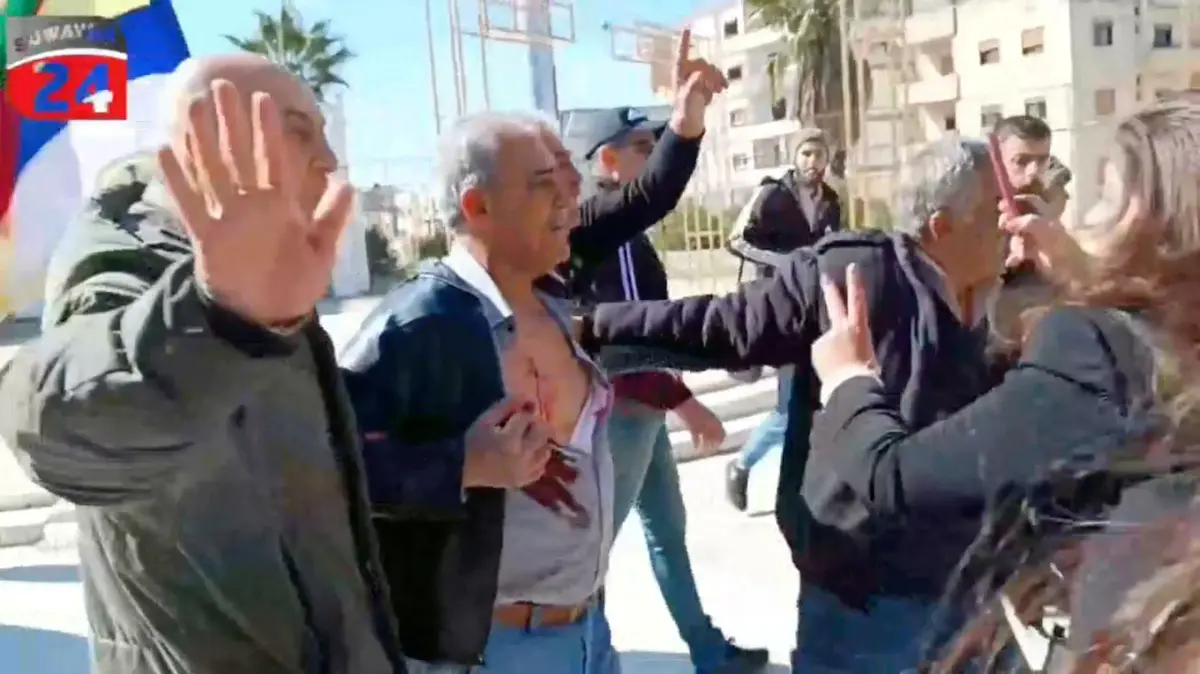Geneva-Sana
Deputy Minister of Foreign Affairs and Expatriates, Dr. Bashar al-Jaafari affirmed that the terrorist war against Syria, the foreign occupation of part of its lands, and the continuation of external support for terrorism have caused catastrophic repercussions on the human rights situation in it and exacerbated them, as Western countries, led by the United States and the European Union, imposed unilateral coercive economic measures targeting the Syrian citizen. His right to life and a decent life.
Al-Jaafari, head of the national committee concerned with preparing the national report for the third session of the universal periodic review mechanism, explained in a statement today before the Human Rights Council that Syria presents to the Council its third national report on time, despite the challenges it faces, in the context of its keenness to implement its international obligations and its belief in international cooperation based on the Charter The United Nations, including within the framework of the mechanism in which Syria effectively contributed to the negotiations related to its establishment as the only international, impartial, non-selective mechanism that ensures the review of the human rights record of all UN member states on an equal footing and through constructive dialogue between states away from polarization, politicization and duplication Standards.
Al-Jaafari indicated that the national report was prepared with the participation of various government sectors, where the members of the National Committee formed to prepare it followed a virtual workshop for training in its preparation organized by the United Nations High Commissioner for Human Rights at the request of the Syrian government in two stages. Two workshops were also held with members of the People’s Assembly on the one hand and with representatives On the part of civil society and stakeholders on the other hand, within the framework of consultation and preparation for this report, indicating that the report focused under the main headings of the normative model on responding to the accepted recommendations from the previous round and implicitly on many of the recommendations that Syria had reservations about, as well as providing information related to developments in the Syria in the field of promoting and protecting human rights during the period under review and the efforts made by the state and the national programs and plans aimed at strengthening the protection of human rights and related initiatives, despite the difficult conditions that Syria is still going through as a result of the continuation of the warTerrorism against it, the unilateral coercive measures imposed on it, the presence of foreign occupying forces on its lands, and the theft of natural national resources and wealth, pointing out that although most of the recommendations directed to Syria in that round were politically motivated and not related to human rights, Syria committed itself to working on implementing the accepted recommendations in the second round. for the mechanism.
Al-Jaafari indicated that with the passage of many years since the beginning of the crisis in Syria, it is necessary to recall that, since 2011, Syria has been facing a systematic terrorist war and foreign occupation of part of its territory, with continued external support for terrorist groups. These grave challenges had catastrophic repercussions on the human rights situation in Syria and increased Its severity and exacerbation was the imposition of unilateral coercive measures by Western countries, led by the United States and the European Union, noting that with the strictness and expansion of these measures, despite the repercussions of the Covid 19 pandemic, it turned into economic terrorism represented by imposing a comprehensive siege targeting the Syrian citizen’s right to life, decent living, health, education and development in all its forms. In addition to the Turkish occupation’s use of water as a weapon and a tool for blackmail and political pressure, which amounts to a crime against humanity, these measures have strongly limited the state’s capabilities to carry out the tasks entrusted to it in an optimal manner to protect its citizens and despite these serious challengesThe state has assumed its responsibilities and duty to preserve its sovereignty, liberate its lands, combat terrorist groups and foreign occupation, and preserve the security and lives of its citizens since the beginning of the crisis.
The Deputy Minister of Foreign Affairs and Expatriates explained that the national report highlights the work of the legislative, judicial and executive authorities and the state’s efforts to rebuild and protect the rights of the Syrian citizen at the national level within the available capabilities, to achieve the goals of the 2030 Agenda for Sustainable Development, to address the COVID-19 pandemic, and to secure an environment that enables Syrian refugees to return safely. Voluntary and generous return to their homeland, where the state has taken, in this context, a package of measures to strengthen the institutional framework, represented by carrying out the constitutional entitlements on time, such as the presidential elections in 2021, the elections of the People’s Assembly 2016-2020, the elections of local administration councils in 2019 and the reformation of the High Relief Authority in 2017 with the aim of responding to the needs of millions Those affected by the repercussions of the crisis, the terrorist war and unilateral coercive measures.
And he said:In addition, the National Committee for International Humanitarian Law was reconstituted, its work was enhanced, the National Administrative Reform Program launched in 2017, and its crystallization in 2021, in addition to the formation of a committee in the Prime Ministry to develop a strategy to address the repercussions of the spread of the Covid-19 virus, and the formation of national committees in various sectors to protect basic human rights in Education, health, ensuring access to water, sanitation and food, in addition to strengthening the judiciary by opening courses to increase the number of judges, forming a committee to document violations in the Ministry of Justice, issuing amnesty laws, numbering 20 decrees until July 2021, and laws aimed, including, to facilitate the return of Syrian refugees by facilitating the issuance of their civil documents In their places of presence through Syrian missions around the world and to ensure the return of security and stability to the liberated areas, in addition to issuing a new Civil Status Law No. 13 of 2021 and issuing the Child Rights Law and licensing new parties to enhance political pluralism.The licensed parties are 11 parties, in addition to 10 parties in the National Front.
Al-Jaafari stressed that, within the framework of working to mitigate the effects of the crisis on its citizens, Syria cooperated with international governmental and non-governmental organizations, and agreed to about 44 international NGOs concerned with humanitarian affairs to work on its territory and facilitated their work, all with the aim of supporting the state's efforts to contribute to mitigating the negative effects of the crisis and coercive measures. Unilaterally and to meet the basic needs of the Syrians, especially the vulnerable groups. The government also continued to support basic materials and services within the available capabilities (food, health, education, electricity, water, transportation…), especially to address the repercussions of coercive measures on the capabilities of both the government and international organizations in this context.
Al-Jaafari pointed out that Syria has been cooperating since the beginning of the crisis and is still cooperating with the United Nations bodies and mechanisms in accordance with the principles established by General Assembly Resolution 46/182, facilitating and providing all facilities for its work on its territory in order to mitigate the effects of the crisis on the affected Syrians, the needy and the returnees. The number of international staff and local cadres working in these international organizations is about 18,000, and he said: Unfortunately, all of this is taking place due to pressure exerted by donors on international humanitarian agencies working in Syria and reducing their funding for humanitarian response plans, in addition to being selective in directing humanitarian aid in Syria.
Al-Jaafari pointed out that due to the focus of many of the recommendations on the issue of cooperation with United Nations mechanisms, it is necessary to note that Syria cooperates with these mechanisms on the basis of the principle of impartiality, non-politicization, respect for the mandate and the provisions of the relevant Human Rights Council Resolution No. 5/2 / and the institutional building package, as It received the Special Rapporteur on unilateral coercive measures and sent another invitation to him to follow up. It also extended an invitation to the Special Rapporteur on the right to water and considered the requests submitted by a number of rapporteurs, including the Special Rapporteur on the protection and promotion of human rights in the context of counter-terrorism. It also sent special invitations to the Special Committee on To investigate the Israeli practices that affect the human rights of the Palestinian people and other Arabs in the occupied territories, but for about ten years it has not visited under the pretext of the security situation.
Regarding the many recommendations regarding dialogue and cooperation with the international community within the framework of the political process, Al-Jaafari reiterated Syria’s commitment to this process and its references in terms of being a path led and owned by the Syrians themselves without any external interference or preconditions. Accordingly, Syria participated in the Geneva, Astana and Sochi meetings, where this participation culminated With the formation of the Constitutional Discussion Committee, which began its work in Geneva in 2019 and has held since then six rounds of meetings, noting that with regard to recommendations regarding advocating adherence to international law, international humanitarian law and international human rights law, Syria considers international peace and security a major goal and a strategic choice, and works to achieve both. In accordance with international law and the values of truth and justice, it affirmed this in the preamble to its 2012 constitution. It is a party to most international conventions and actively participates in the work of the UN committees concerned with promoting respect for international law.
He follows









